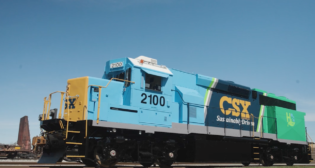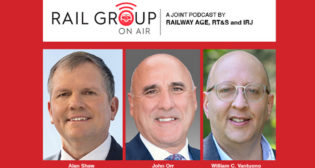
Educating the next generation of railroaders
Written by William C. Vantuono, Editor-in-Chief“Well, Dad, I think I might like to work for a railroad. It’s a pretty important business, and I hear that the pay and benefits are really good. And I’ve always been interested in trains.” “That’s great. Railroads are doing well these days. But I’m not so sure about where you could go to college for that. Is there such a thing as a railroad major?”
This fictional father’s concern is legitimate, because—aside from general programs in transportation or logistics—the academic world doesn’t offer very much in the way of a railroad-specific education. True, there are excellent training resources for railroaders already on the job, like those that Simmons-Boardman’s Railway Educational Bureau has offered for more than 100 years. But what about young people who may find that they would be interested in a railroad career, given some educational background?
Railroads do a lot of recruiting, but most of the fresh young faces that sign up don’t have formal education or training in railroading. That, however, is changing. “A large number of senior railway engineers are reaching retirement, and there are limited sources of trained engineers with railroad experience,” says Dr. Allan M. Zarembski, who has started the Railway Engineering and Safety Program at the University of Delaware. “There’s a need for training a new generation of railroad engineers, supervisors, and managers, as well as a need for developing innovative new technologies to reduce costs and improve efficiency of infrastructure and rolling stock. Rail transit is growing, spurred by a need for efficient urban transportation modes. And high speed rail—a major area of new research—could become the next interstate highway-level government project.”
For those looking to advance their railroad careers, there are a growing number of professional development programs. “Our industry needs to support and sustain good people,” says Dennis Neilson, Director of the Railway Management Certificate Course program at Michigan State University, which since 2006 has graduated more than 100 students from all areas of the industry. ”
Here are just a few examples of the types of educational programs now available to graduate and undergraduate college students, as well as those already “working on the railroad”:
• The Railroad Engineering Program in the Department of Civil and Environmental Engineering at the University of Illinois at Urbana-Champaign, headed by Dr. Christopher Barkan, offers courses in railroad engineering, railway signaling and operation, and advances in rail technology. UIUC’s rail curriculum has expanded from one course to six, the largest of any North American university, and now includes a new course in high speed rail engineering. Research is conducted in safety and risk analysis, hazardous materials transport, energy efficiency, rail capacity, railroad operating economics, and new rail technologies. UIUC students have won several awards for research presented at international conferences and papers in peer-reviewed journals.
• The National University Rail (NURail) Center is a new rail-focused, Tier-1 University Transportation Center under the U.S. Department of Transportation Research and Innovative Technology Administration (RITA) program. A seven-university consortium led by the Rail Transportation and Engineering Center (RailTEC) at UIUC, the NURail Center is hosted at the UIUC Department of Civil and Environmental Engineering. Participating universities include the University of Illinois at Chicago, Massachusetts Institute of Technology, Michigan Tech, University of Kentucky, University of Tennessee-Knoxville, and Rose-Hulman Institute of Technology. The central theme of its research program is shared rail corridors and higher-speed passenger railway networks. The CEE department is in the midst of a $2.4 million interdisciplinary, FRA-funded research project that aims to better understand the unique demands placed on rail infrastructure when subjected to higher-speed passenger and freight trains, as well as to improve the design of concrete crossties and elastic fastening systems.
• The Railway Engineering and Safety Program at the University of Delaware provides education and advanced research on railway engineering, safety, operations, and economics for the North American and international railway and transit industry. The program provides training at the undergraduate and graduate levels to include degree and professional training, with on-site and off-site (online) short courses. Courses include “Introduction to Railroad Engineering-Design of Railroad Track,” “Railroad Engineering-Degradation and Maintenance,” and “Railroad Safety and Derailment Prevention.” Professional short courses, which provide CEUs (Continuing Education Units) for professional engineers, include “Rail Problems and Maintenance,” “Rail Grinding,” Maintenance of Continuously Welded Rail,” Accident Investigation and Derailment Prevention,” and “Inspection Technologies.” The program’s research focus is on such areas as fatigue and rail life management, turnout safety and maintenance, and vehicle/track dynamics and interaction.
• The Railway Management Certificate Course program at Michigan State University has recently been incorporated into MSU’s Eli Broad College of Business. The four-week program includes classroom and field work. The lecturers, anchored by Bob Gallamore (UP, TTCI) and Steve Ditmeyer (USDOT, FRA, BN), read like a list of “who’s who in railroading”: Ed Burkhardt (Rail World), Ron Batory (Conrail), John Lanigan (BNSF), Mike Paris (Belt Railway of Chicago), Craig King (CSX, RJ Corman), Jim McLellan (NS), Lou Thompson (World Bank), Paul Vilter (Amtrak), Lisa Stabler (TTCI), Jeff Young and Ed Kemp (UP), Joe Szabo (FRA), Joe Boardman (Amtrak), Bob VanderClute and John Gray (AAR), Wall Street analyst Tony Hatch, and others. Some are retired, some are not, but all are able to provide their unique perspectives on every facet of railroading. Many graduates, says Dennis Neilson, “have been afforded significant promotion opportunities.” Neilson will eventually be turning the director’s chair over to Assistant Director of Executive Development Programs Nick Little, who began his railroading career with British Rail.
• TTCI and the Engineering Department at Colorado State University-Pueblo are now offering a railroad engineering Master’s degree program. The first of two courses, “Vehicle Dynamics and Railroad Structures,” will be offered this fall, followed by “Fleet Management and Railroad Power Systems” in spring 2014.
• The Railway Educational Bureau, which has been providing comprehensive classroom and hands-on instruction since 1909, is adding online courses. REB programs include Distance Training, “self-paced, economical courses to learn technical skills”; Workshops, “high-impact training sessions alongside a variety of individuals from different rail industry organizations”; Work Site Training, “exclusive training sessions with our experienced instructors at the location of your choice”; and Training-Related Consulting, “a service designed to help with a creative solution to training problems,” according to Director Brian Brundige. “Our courses have been used by tens of thousands of people across a wide range of disciplines to enhance their knowledge in order to help them become successful in the rail industry. We offer courses covering a broad spectrum of disciplines.” For more information, see www.railwayeducationalbureau.com.



